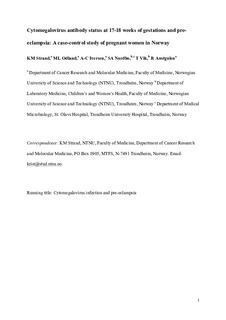Cytomegalovirus antibody status at 17 - 18 weeks of gestation and preeclampsia: a case-control study of pregnant women in Norway
Strand, Kristin Melheim; Odland, Maria Lisa; Iversen, Ann-Charlotte; Nordbø, Svein Arne; Vik, Torstein; Austgulen, Rigmor
Journal article, Peer reviewed
Accepted version
Permanent lenke
http://hdl.handle.net/11250/2459070Utgivelsesdato
2012Metadata
Vis full innførselSamlinger
Originalversjon
BJOG: an International Journal of Obstetrics and Gynaecology. 2012, 119 (11), 1316-1323. 10.1111/j.1471-0528.2012.03420.xSammendrag
Objective
To assess the association between maternal cytomegalovirus (CMV) antibodies in mid-pregnancy and preeclampsia.
Design
Nested case–control study. Setting Pregnancies registered in the Norwegian Mother and Child Cohort Study (MoBa): a large population-based pregnancy cohort (1999–2006).
Sample
A cohort of 1500 women with pre-eclampsia and 1000 healthy pregnant women.
Methods
Plasma samples and pregnancy-related information were provided by the MoBa. Antibody status (CMV IgG and CMV IgM) and levels (CMV IgG) at 17–18 weeks of gestation were determined by enzyme-linked immunosorbent assay (ELISA).
Main outcome measure
A diagnosis of pre-eclampsia, as defined in the Medical Birth Registry of Norway.
Results
There was no evidence of an effect of CMV IgG seropositivity on the likelihood of developing pre-eclampsia, and CMV IgG antibody levels among women who were seropositive did not differ between groups. Adjusted for maternal age, parity and smoking, the odds ratio for pre-eclampsia in women seropositive for CMV IgG was 0.89 (95% CI 0.74–1.05; P = 0.17). The proportions of women who were seropositive for IgM did not differ between women with pre-eclampsia and women who were healthy (P = 0.98). Among nulliparous women, the proportion of women who were seropositive for CMV IgG was slightly lower among women with pre-eclampsia (53.5%) than among healthy women (59.8%) (P = 0.03). Subgroup analyses were performed for women with early or late onset pre-eclampsia, with preterm delivery and/or with neonates that were small for gestational age, but antibody status did not differ between pre-eclampsia subtypes and controls.
Conclusions
The presence of maternal antibodies to CMV was not associated with pre-eclampsia in our study. The results suggest that CMV infection is unlikely to be a major cause of preeclampsia.
